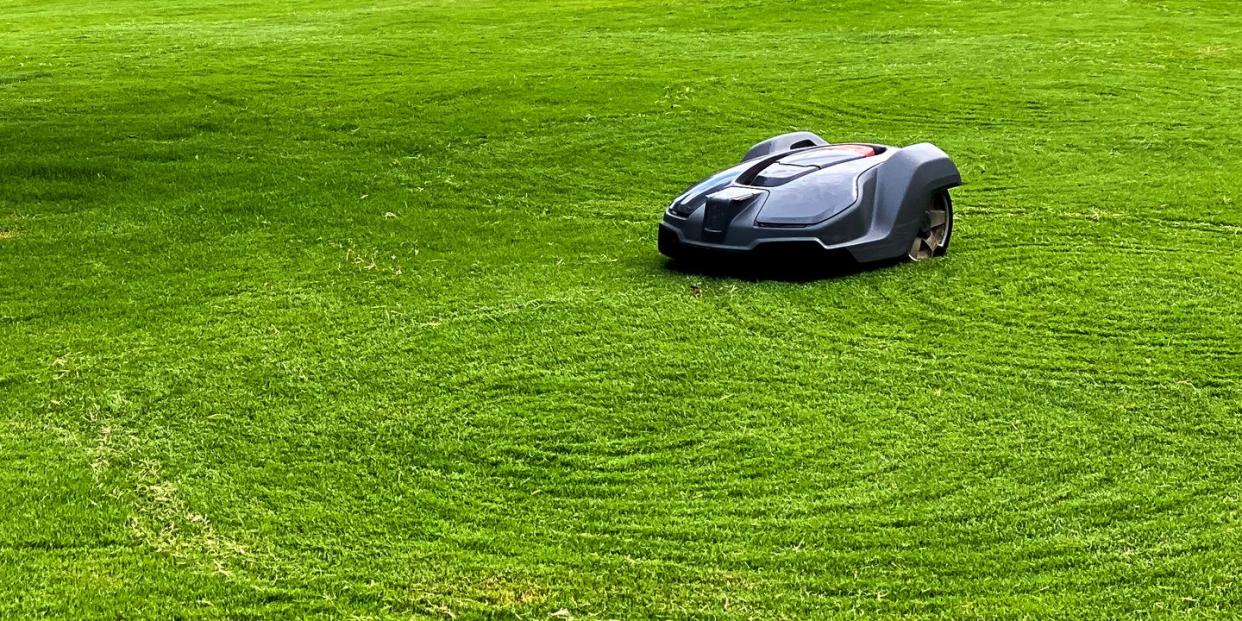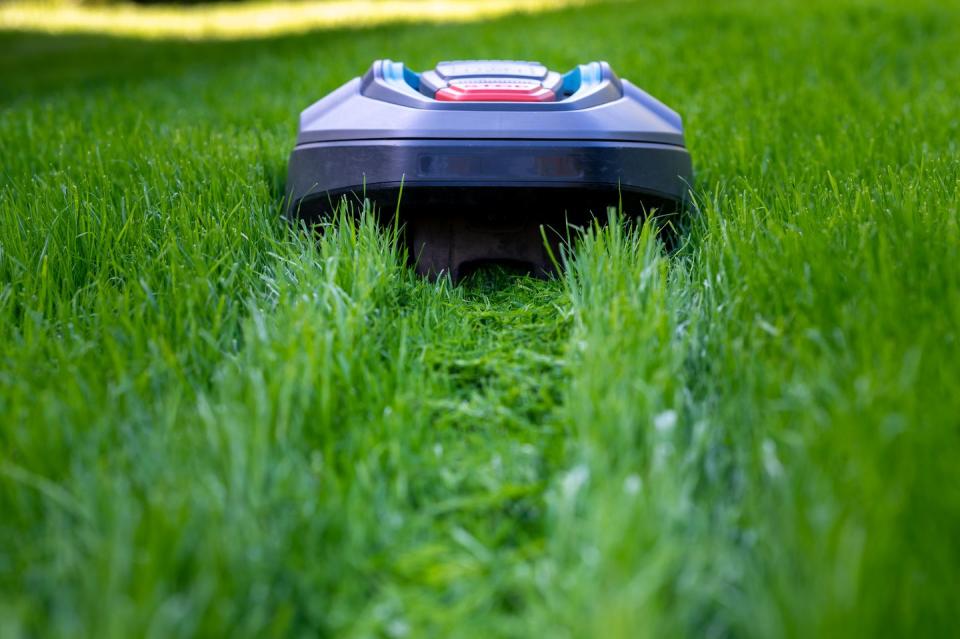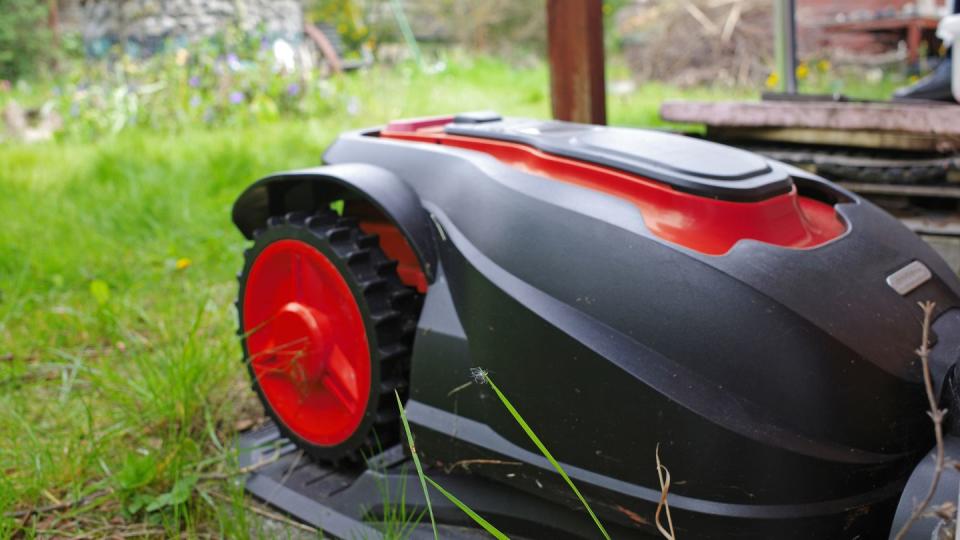Can A Robot Take Care of Your Lawn?

It seems like a too-good-to-be-true vision of a sci-fi future: Set up a cute little robot mower, and you'll never have to mow your lawn again! No more sweaty Saturday afternoons wasted when you could be doing something more fun. You may even have seen a robot lawn care helper zipping around your neighbors lawn and thought, must be nice. But is using a robotic mower right for your yard?
Although they may seem like some futuristic gadget, robotic mowers actually have been around for a long time. "They were introduced in Europe a couple of decades ago at the residential level," says Clint Waltz, PhD, turfgrass expert at the University of Georgia. "The biggest advantage they offer is time and labor savings."
Robot mowers are worth investigating if you're into having a perfectly-manicured lawn or if you're tired of hassling with a traditional gas or electric mower. On the plus side, there's no more making sure the battery is charged, or that you have gas or running to get the blades sharpened. Robotic mowers can operate in a light rain and can avoid obstacles, such as wildlife, pets or most toys with their onboard cameras. Dreamy, right?
All that being said, robotic mowers are not perfect. For example, you'll still need to do detail work such as string trimming around the drive or edging around garden beds, shrubs, or trees manually. Still, that's a minimal time commitment compared to having to mow and trim your entire yard.

Another drawback to consider? Cost. If you purchase one outright, basic robotic mowers start around $1000. But the most hi-tech units can cost up to $6000, so it’s not a small investment. That being said, in some areas of the country, landscapers have fleets of these mowers and will lease and maintain them for clients, says Waltz. In larger suburban areas, where you may be able to lease, the fee typically starts from $20 per week but will depend your yard’s size, the type of robotic mower, and the services offered. There's usually an additional fee for trimming and edging, which must be done manually by your lawn service.
Here's what else you need to know about these high-tech mowers and whether they're right for you:
How Do Robotic Mowers Work?
The earliest versions of robotic mowers (which still are available) use a boundary wire that must be installed a few inches deep into the earth, along the perimeter of your lawn. The wire defines the outer edges of the mowing area and is set up to accommodate areas where you don't need to mow, such as sidewalks. Sometimes a channel must be cut through hardscape, such as your driveway, to allow for the wire.
You'll either need to hire someone for installation (which can run $500 or more) or tackle it yourself, if you're mechanically-inclined. You'll also have to repair the wire if it gets damaged by animals, a snowplow, or a shovel if you're working near it in your garden.

Much like a Roomba, but for your lawn, the mower has an electric docking station where it goes to charge, so you'll need an exterior outlet to plug it in. Once it's programmed, the robot goes out to mow, then returns to its charging station when there's a certain amount of battery life remaining, such as 10 or 15 percent. Once charged, it heads back out to finish the job. Typically, your robot will mow every day or two.
A new generation of robot mowers uses satellite positioning or onboard sensors instead of a boundary wire. This enables you to control everything from no-go zones to cutting height to mowing schedules with the use of an app, says Waltz.
The new units require an area with wide-open sky where you can situate the satellite receiver, so they may not be a good choice on lots with heavy tree cover. As you'd expect, these type of robot mowers are much pricier than the first-generation ones.
Are Robotic Mowers Worth It?
There definitely are plenty of benefits. For starters, they're whisper-quiet, so you can mow without annoying your neighbors early in the morning or late at night. And because the mowers are on the job every day or two, your lawn will maintain that pristine just-mowed look.
Interestingly, the frequent mowing may be good for your lawn, too. "Because the mower takes off very little leaf tissue every time, there's less stress on the plant," explains Waltz. "Our research has shown improved rooting and improved density of the canopy."
That means a thicker, more lush lawn that may be less vulnerable to invading weed seeds. Most robotic mowers also use thin razor-like blades, leaving a clean cut instead of a ragged edge, so your lawn looks better, too, says Waltz.
Are There Disadvantages to Robotic Mowers?
There are some downsides worth considering before buying. The cutting width is pretty narrow—usually around 8 to 9 inches wide, which requires multiple passes for a mower to complete so it can take hours to finish the job. In addition, you'll want to size the mower to the yard, because some are ideal for only ¼-acre, while others are suited for 2-plus acres. Naturally, a bigger mower = a higher price tag.
You also need to find a place for the docking station; Waltz recommends identifying at least two locations in your yard that you can swap from year to year, because repeat trips to the charger may cause wear and tear on the grass in that area.

Finally, there's some risk of theft. While most robotic mowers have deterrents such as an alarm or GPS tracking, they're lightweight enough that thieves can snatch them. However, robotic mowers will not function outside their programmed boundaries, and you can track those that have GPS. So, essentially, stolen units just become a big burden to thieves, says Waltz.
What to Consider Before You Buy
Whether or not a robotic mower is right for you might just come down to the specifics of your lawn. Some robot mowers aren't great on slopes; if you have a lawn with an incline, you'll need a larger mower to help it get up and down the grade, says Waltz. Another issue to consider: robot mowers may get bogged down by extra-tall grass. And if your yard has weird angles or divots, these mowers sometimes get stuck.
In the end, there's always a bit of a learning curve with any new technology, but if your lawn is fairly straightforward, and you'd rather be doing something other than mowing every weekend, a robotic mower might just become your new, machine-age best friend.
You Might Also Like


